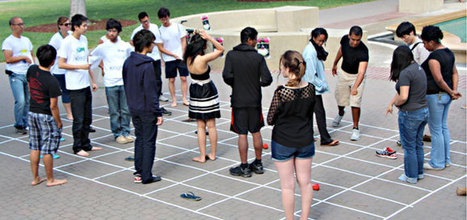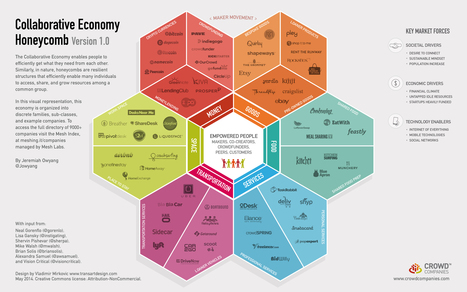 Your new post is loading...
 Your new post is loading...
"In The Evolved Apprentice, Kim Sterelny argues that the divergence stems from the fact that humans gradually came to enrich the learning environment of the next generation. Humans came to cooperate in sharing information, and to cooperate ecologically and reproductively as well, and these changes initiated positive feedback loops that drove us further from other great apes. Sterelny develops a new theory of the evolution of human cognition and human social life that emphasizes the gradual evolution of information sharing practices across generations and how information sharing transformed human minds and social lives. Sterelny proposes that humans developed a new form of ecological interaction with their environment, cooperative foraging, which led to positive feedback linking ecological cooperation, cultural learning, and environmental change. The ability to cope with the immense variety of human ancestral environments and social forms, he argues, depended not just on adapted minds but also on adapted developmental environments."
Tracy McVeigh: Our natural instinct for altruism is being destroyed by the demands of modern life, claims a new book
"In our age of predatory markets and make-believe democracy, our troubled political institutions have lost sight of real people and practical realities. But if you look to the edges, ordinary people are reinventing governance and provisioning on their own terms. The commons is arising as a serious, practical alternative to the corrupt Market/State. The beauty of commons is that we can build them ourselves, right now. But the bigger challenge is, Can we learn to see the commons and, more importantly, to thinklike a commoner?"
This article is a tribute to Elinor Ostrom. It explores two enduring lessons she taught: a substantive lesson that involves embracing complexity and context, an
Professor Robert Sapolsky's baboon studies offer insight into the negative effects of hierarchy in society: "f they(baboons) are able to, in one generation transform what are supposed to be textbook social systems sort of engraved in stone, we don’t have any excuse when we say that there are certain inevitabilities about human social systems.”
Via june holley
For six decades, the classic cooperation test known as the prisoner’s dilemma has been a mainstay of graduate courses on game theory and behavioral economics, not to mention in Hollywood detective series.
"The widespread existence of cooperation is difficult to explain because individuals face strong incentives to exploit the cooperative tendencies of others. In the research reported here, we examined how the spread of reputational information through gossip promotes cooperation in mixed-motive settings. Results showed that individuals readily communicated reputational information about others, and recipients used this information to selectively interact with cooperative individuals and ostracize those who had behaved selfishly, which enabled group members to contribute to the public good with reduced threat of exploitation. Additionally, ostracized individuals responded to exclusion by subsequently cooperating at levels comparable to those who were not ostracized. These results suggest that the spread of reputational information through gossip can mitigate egoistic behavior by facilitating partner selection, thereby helping to solve the problem of cooperation even in noniterated interactions."
"MIT researchers have found that cells in a bacterial colony grow in a way that benefits the community as a whole. That is, while an individual cell may divide in the presence of plentiful resources to benefit itself, when a cell is a member of a larger colony, it may choose instead to grow in a more cooperative fashion, increasing an entire colony’s chance of survival. "
"Stanford computer scientists have created a website to help organizers plan events that are more likely to succeed or allow them to pull the plug on impending flops before they occur.
The website, called Catalyst, is based on a behavioral science concept known as the threshold model of collective action, which posits that people may be reluctant to commit to participating in activity until they see others taking part, at which point interest surges and the activity becomes successful. But if participation doesn’t reach this threshold point, the event is likely to fail. Catalyst builds this principle into software. The website allows people to enter a few details, such as date, time, description of the event and the number of participants needed to make it a success. If signups don't hit this threshold point by the deadline, Catalyst emails organizers and would-be participants a warning."
" Recent studies suggest that allowing individuals to choose their partners can help to maintaincooperation in human social networks; this behaviour can supplement behavioural reciprocity,whereby humans are influenced to cooperate by peer pressure. However, it is unknownhow the rate of forming and breaking social ties affects our capacity to cooperate. Here weuse a series of online experiments involving 1,529 unique participants embedded in 90experimental networks, to show that there is a ‘Goldilocks’ effect of network dynamism on cooperation. When the rate of change in social ties is too low, subjects choose to have many ties, even if they attach to defectors. When the rate is too high, cooperators cannot detach
from defectors as much as defectors re-attach and, hence, subjects resort to behavioural reciprocity and switch their behaviour to defection. Optimal levels of cooperation are achieved at intermediate levels of change in social ties"
"Imagine the following scenario: You have two different tribes, your collectivist tribe over here—where everything's in common, and your individualist tribe over there. Imagine these tribes not only have different ways of cooperating, but they rally around different gods, different leaders, different holy texts that tell them how they should live—that you're not allowed to sing on Wednesdays in this group, and in this group over here, women are allowed to be herders, but in this group over there, they're not; different ways of life; different ways of organizing society. Imagine these societies existing separately, separated by a forest that burns down. The rains come, and then suddenly you have a nice lovely pasture, and both tribes move in. Now the question is: How are they going to do this? We have different tribes that are cooperative in different ways. Are they going to be individualistic? Are they going to be collectivists? Are they going to pray to this god? Are they going to pray to that god? Are they going to be allowed to have assault weapons or not allowed to have assault weapons? That's the fundamental problem of the modern world—that basic morality solves the tragedy of the commons, but it doesn't solve what I call the "tragedy of common sense morality."
Two Michigan State University evolutionary biologists offer new evidence that evolution doesn't favor the selfish, disproving a theory popularized in 2012. "We found evolution will punish you if yo...
"In high-trust societies, punishment is likely to be viewed as attempts to enforce cooperative norms, which encourages others to behave according to such norms. In high-trust societies people may be more likely to notice norm violations such as free-riding on public transportation or having loudphone conversations in public places. And they may be more likely to enforce cooperative norms, also because they trust others to support such norm enforcement. Over time, such activities promote trust and cooperation in such a manner that norm enforcement is less often called for."
|
"The commons is a way of allocating access and use rights in resources that does not give anyone exclusive rights to exclude anyone else. A city street is a commons: anyone who has a car or a bicycle can drive on the road; anyone who can walk or use a wheelchair can travel the sidewalks. No individual or company has the right to exclude anyone or charge them for access. From streets and highways, to canals and waterways, major shipping lanes and navigable rivers; basic scientific knowledge, mathematical algorithms, basic ideas; all these have been kept as commons in modern market economies because they provide enormous freedom of action to a wide range of productive behaviors—both economic and social. Wikipedia and the free open source software have become examples of remarkable innovation in the production of information."
"One of the great achievements of the late Professor Elinor Ostrom was the identification of key design principles for successful commons. She set forth eight of them in her landmark 1990 book, Governing the Commons. The wording of those principles is aimed at social scientists who study the management of common-pool resources from a neutral, non-participatory, scientific perspective. As a result, the principles are not as accessible to the general public, nor do they reflect the direct experiences and first-person voice of commoners. The first German Sommerschool on the Commons, which took place in Bechstedt/Thuringia in June 2012, decided to remedy this problem. Participants took part in intense debates over what a new set of principles for commoning – based on the Ostrom principles – might look like if they reflected the personal perspective of commoners themselves. The result is a statement, "Eight Points of Reference for Commoning,” which can be seen as a re-interpretation – remix? – of Ostrom's design principles".
"a six week course using asynchronous forums, blogs, wikis, mindmaps, social bookmarks, synchronous audio, video, chat, and Twitter to introduce the fundamentals of an interdisciplinary study of cooperation: social dilemmas, institutions for collective action, the commons, evolution of cooperation, technologies of cooperation, and cooperative arrangements in biology from cells to ecosystems."
a six week course using asynchronous forums, blogs, wikis, mindmaps, social bookmarks, synchronous audio, video, chat, and Twitter to introduce the fundamentals of an interdisciplinary study of cooperation: social dilemmas, institutions for collective action, the commons, evolution of cooperation, technologies of cooperation, and cooperative arrangements in biology from cells to ecosystems.
"Get to know the basics of worker cooperatives, how they work and what they do, from management to the everyday practice of cooperation. Worker cooperatives are democratically and equally owned by the workers, and adhere to the principles of one worker, one share, one vote. Through activities, guided readings, and facilitated conversations with worker-cooperative professionals and other students, participants will become familiar with how co-ops work and the growing worker-cooperative movement.
You will receive a certificate upon completion of the course.
This course will take place between April 16 and 17. It will be five hours total over two nights. We will poll participants to find the best time to hold the sessions. It will be offered again every other month."
"I don't think it's a coincidence that of all the kinds of ways human beings could organize themselves into networks, that's what we do. We evince degree assortativity, and I don't think it's a coincidence that we do that. We assemble ourselves into groups, the group now has this property, this germ- resistance property, which is a property of the group, but which, as it turns out, also benefits and affects us. Now, being a member of that group, we are less likely to acquire pathogens. And this sets the stage for a set of ideas that we and others have been exploring that shed light on multi-level selection and other kinds of contentious ideas in the biological and the social sciences. And we have a number of fellow travelers on this road—László Barabási, Dirk Helbing, Tooby and Cosmides, Frans de Waal, Nowak, Rand, Santos—people working on these related areas of interactions among animals and people, and what this means. In fact, David Rand and Josh Green and Martin Nowak just had a nice paper this past year — I was asked to highlight some papers—looking at whether you can use time to response as a kind of heuristic for understanding are people intuitive cooperators and rationally selfish, or do they exercise rational self-control over a kind of instinctive greed? The data they presented in that paper, to my eyes, was quite compelling—that we are intuitively wired to cooperate."
"The article considers several working anarchies in the networked environment, and whether they offer a model for improving on the persistent imperfections of markets and states. I explore whether these efforts of peer mutualism in fact offer a sufficient range of capabilities to present a meaningful degree of freedom to those who rely on the capabilities it affords, and whether these practices in fact remain sufficiently nonhierarchical to offer a meaningful space of noncoercive interactions. The real utopias I observe here are perfect on neither dimension. Internally, hierarchy and power reappear, to some extent and in some projects, although they are quite different than the hierarchy of government or corporate organization. Externally, there are some spectacular successes, some failures to thrive, and many ambiguous successes. In all, present experience supports neither triumphalism nor defeatism in the utopian project. Peer models do work, and they do provide a degree of freedom in the capabilities they provide. But there is no inexorable path to greater freedom through voluntary open collaboration. "
Changing the Future of First Response Cooperation
"Many Americans have not heard of the commons except in connection with the word “tragedy.” We’ve all heard the famous tragedy of the commons parable. It holds that any shared resource invariably gets over-exploited and ruined. Since the “tragedy meme” appeared in a famous 1968 essay by Garrett Hardin, it has been drummed into the minds of undergraduates in economics, sociology and political science classes. It serves as a secular catechism to propagandize the virtues of private property and so-called free markets. Thanks to the tragedy smear, most people don’t realize that the commons is in fact a success story – that it is a durable artifact of human history, that it is a way to effectively manage shared resources, and that it lies at the heart of a growing political and cultural movement."
A major new technology has been developed by The University of Nottingham, which enables all of the world's crops to take nitrogen from the air rather than expensive and environmentally damaging fertilisers.
|



 Your new post is loading...
Your new post is loading...




































I have not yet read this, but we're talking about similar aspects of cultural evolution my Literacy of Cooperation course: biology equipped us for social learning, but cultural evolution took over when we began inventing communication media (language, writing) that extend social learning across time and space.